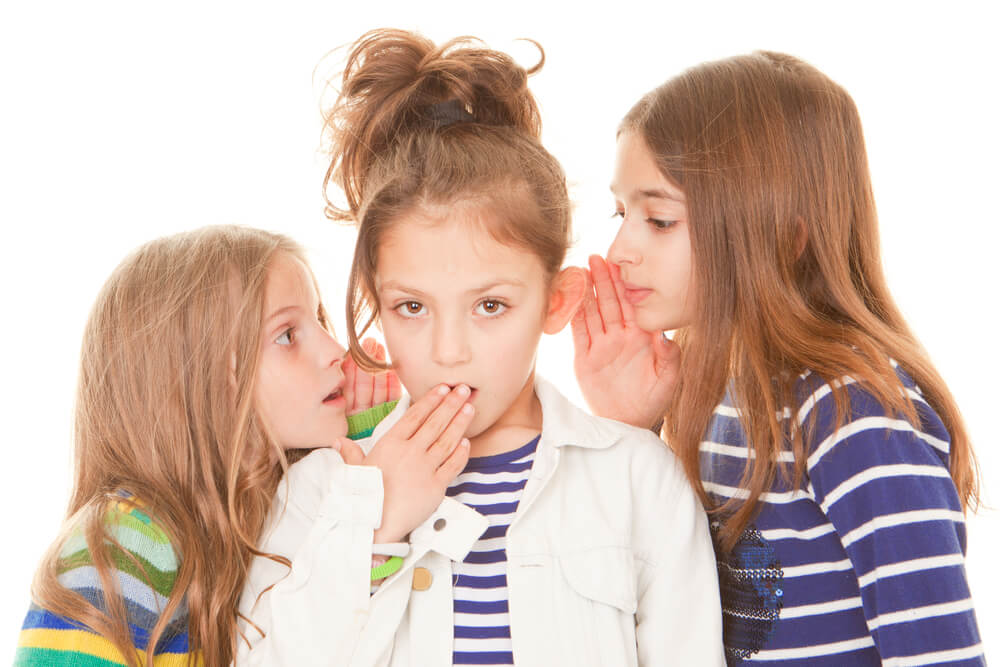How to Keep Your Child from Being Manipulated by Their Friends

It’s normal for children in school to begin to expand their circle and meet new peers who will help them gain social skills. These new connections are very beneficial for the mental health of little ones, but it’s important to learn how to help children avoid being manipulated by their friends.
Educating children so that they know how to identify when they’re being used is of utmost importance. This will allow them not to become emotionally dependent on their friends or feel bad about their attitudes. Some children can be very cruel and use blackmail and trickery to manipulate their peers.
You might be interested in: 6 Techniques to Help Kids Face Teasing
5 tips to keep your children from being manipulated by their friends
All children have different personalities. While some tend to be more outgoing and social, others tend to be more passive and withdrawn. This is perfectly fine, as each person is unique, with particular characteristics, and deserves to be respected.
However, when a shy child makes friends with one of their peers, it’s important that there are no power imbalances. A child who’s too submissive and dependent can be influenced and manipulated without even realizing it. Here are five tips to keep this from happening.
1. Improve your child’s self-esteem
If you want to prevent your child from being manipulated at any time in their life, it’s crucial that you cultivate healthy self-esteem and self-confidence in your child. Some children are more susceptible to victimization due to the fear of being left without friends. This is taken advantage of by more astute children without emotional responsibility who see in their peers people who are easy to manipulate.

For this reason, try to reinforce your children’s self-esteem while instilling respect, love, and empathy for others. Let them know that they’re very valuable, unique, and interesting and that many children will want to be their friends when they really know them.
2. Identify unusual behavioral changes
When your child begins to have a new friendship and suddenly changes their personality and modifies their behaviors, it’s important to remain attentive. Even more so when they blindly defend their friend and even get angry when you show your concern. This can be identified, for example, through vocabulary, clothing, and mood changes.
3. Never use manipulation in your home
It seems obvious, but sometimes parents unintentionally (or intentionally) use emotional blackmail to get their children to do what they want. However, this has serious repercussions on children’s emotional well-being.
So, if you don’t want your child to be blackmailed or manipulated by their peers, never do it with them. Remember that the example starts at home and, as a mom, you’re one of the main role models for your little ones.
4. Encourage individuality
When children and adolescents tend to be more submissive, they’re very likely to be influenced or manipulated by their friends in order to fit in with their peer group. However, a true friend won’t ask another to change in order to be friends with them. On the contrary, they’ll celebrate their difference and defend them from ridicule.

So, encourage individuality in your child, and if you notice that they’re modifying their essence in order to fit in with a group, teach them that the beauty of humanity lies in our differences. And if they insist on finding new facets of their personality, let it be of their own free will and not as an imposition.
5. Cultivate dialogue and courage
When shy children are manipulated by their friends to do things that make them feel uncomfortable, it’s essential that they have the intelligence to reflect on their actions. Having an internal dialogue where they ask themself how they feel and if they’re willing to accept the consequences of their actions is crucial.
Also, they must have the courage to stand up for their own opinions, even if it makes their peers uncomfortable. You have to remind them that a true friend will never pressure them to do things they don’t want to do and that it’s better to have a clear conscience than to live with regrets.
To prevent your child from being manipulated by their peers, educate them by example
In their emotional learning process, it’s essential to provide children with the tools to learn to value and respect themselves as people. These teachings accompanied by your example will be the pillars so that, whether they’re children or adolescents, they won’t allow themselves to be manipulated by their friends and will know how to react to blackmail and peer pressure.
It’s normal for children in school to begin to expand their circle and meet new peers who will help them gain social skills. These new connections are very beneficial for the mental health of little ones, but it’s important to learn how to help children avoid being manipulated by their friends.
Educating children so that they know how to identify when they’re being used is of utmost importance. This will allow them not to become emotionally dependent on their friends or feel bad about their attitudes. Some children can be very cruel and use blackmail and trickery to manipulate their peers.
You might be interested in: 6 Techniques to Help Kids Face Teasing
5 tips to keep your children from being manipulated by their friends
All children have different personalities. While some tend to be more outgoing and social, others tend to be more passive and withdrawn. This is perfectly fine, as each person is unique, with particular characteristics, and deserves to be respected.
However, when a shy child makes friends with one of their peers, it’s important that there are no power imbalances. A child who’s too submissive and dependent can be influenced and manipulated without even realizing it. Here are five tips to keep this from happening.
1. Improve your child’s self-esteem
If you want to prevent your child from being manipulated at any time in their life, it’s crucial that you cultivate healthy self-esteem and self-confidence in your child. Some children are more susceptible to victimization due to the fear of being left without friends. This is taken advantage of by more astute children without emotional responsibility who see in their peers people who are easy to manipulate.

For this reason, try to reinforce your children’s self-esteem while instilling respect, love, and empathy for others. Let them know that they’re very valuable, unique, and interesting and that many children will want to be their friends when they really know them.
2. Identify unusual behavioral changes
When your child begins to have a new friendship and suddenly changes their personality and modifies their behaviors, it’s important to remain attentive. Even more so when they blindly defend their friend and even get angry when you show your concern. This can be identified, for example, through vocabulary, clothing, and mood changes.
3. Never use manipulation in your home
It seems obvious, but sometimes parents unintentionally (or intentionally) use emotional blackmail to get their children to do what they want. However, this has serious repercussions on children’s emotional well-being.
So, if you don’t want your child to be blackmailed or manipulated by their peers, never do it with them. Remember that the example starts at home and, as a mom, you’re one of the main role models for your little ones.
4. Encourage individuality
When children and adolescents tend to be more submissive, they’re very likely to be influenced or manipulated by their friends in order to fit in with their peer group. However, a true friend won’t ask another to change in order to be friends with them. On the contrary, they’ll celebrate their difference and defend them from ridicule.

So, encourage individuality in your child, and if you notice that they’re modifying their essence in order to fit in with a group, teach them that the beauty of humanity lies in our differences. And if they insist on finding new facets of their personality, let it be of their own free will and not as an imposition.
5. Cultivate dialogue and courage
When shy children are manipulated by their friends to do things that make them feel uncomfortable, it’s essential that they have the intelligence to reflect on their actions. Having an internal dialogue where they ask themself how they feel and if they’re willing to accept the consequences of their actions is crucial.
Also, they must have the courage to stand up for their own opinions, even if it makes their peers uncomfortable. You have to remind them that a true friend will never pressure them to do things they don’t want to do and that it’s better to have a clear conscience than to live with regrets.
To prevent your child from being manipulated by their peers, educate them by example
In their emotional learning process, it’s essential to provide children with the tools to learn to value and respect themselves as people. These teachings accompanied by your example will be the pillars so that, whether they’re children or adolescents, they won’t allow themselves to be manipulated by their friends and will know how to react to blackmail and peer pressure.
All cited sources were thoroughly reviewed by our team to ensure their quality, reliability, currency, and validity. The bibliography of this article was considered reliable and of academic or scientific accuracy.
- Forward, S., Frazier, D., & Newman, C. F. (1997). Emotional Blackmail: When the People in Your Life Use Fear, Obligation, and Guilt to Manipulate You. Disponible en: https://www.proquest.com/openview/50191123da47092ef7ad8deb8364ceb3/1?pq-origsite=gscholar&cbl=28723
- Hoddinott, J. (1992). Rotten kids or manipulative parents: Are children old age security in Western Kenya?. Economic development and cultural change, 40(3), 545-565. Disponible en: https://www.journals.uchicago.edu/doi/pdfplus/10.1086/451960
- Palacios, X. (2019). Adolescencia: ¿una etapa problemática del desarrollo humano? Revista Ciencias de la Salud, 17(1), 5-8. Disponible en: http://www.scielo.org.co/scielo.php?script=sci_arttext&pid=S1692-72732019000100005
This text is provided for informational purposes only and does not replace consultation with a professional. If in doubt, consult your specialist.








